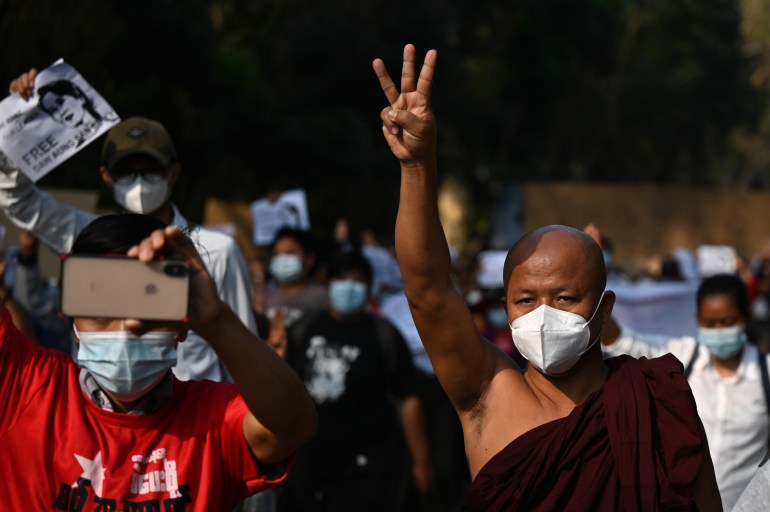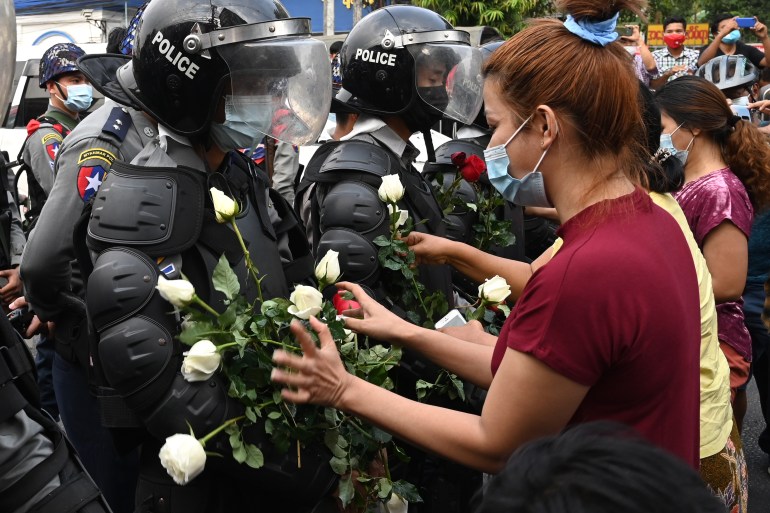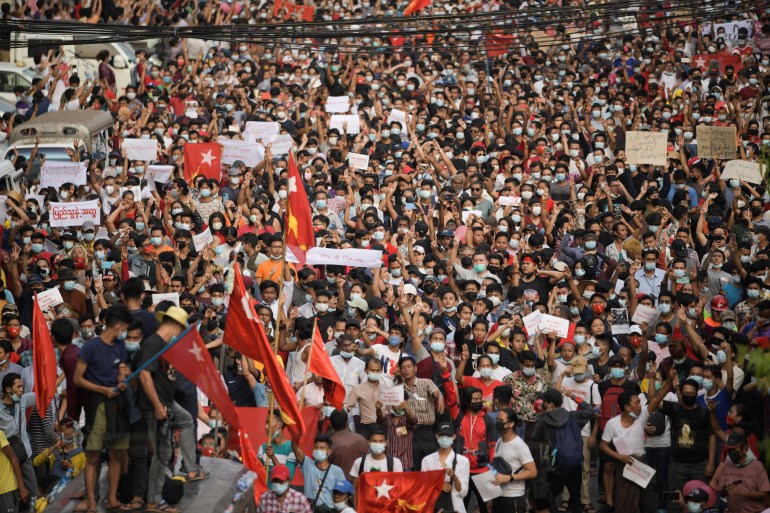Tens of thousands protest Myanmar coup amid internet blackout | Myanmar News
Tens of thousands of people rallied again in Myanmar’s biggest city Yangon on Sunday denouncing a military coup and demanding the release of elected leader Aung San Suu Kyi.
Protesters marching in Yangon for a second consecutive day on Sunday carried red balloons – the colour of Suu Kyi’s National League for Democracy (NLD) – and chanted, “We don’t want military dictatorship! We want democracy!”
They walked in the bright sunshine down the middle of the road, waving NLD flags and making the three-figure salute that has become a symbol of protest against the February 1 coup. Drivers honked their horns and passengers held up photos of Aung San Suu Kyi.
“We will move forward and keep demanding until we get democracy. Down with the military dictatorship,” protester Myo Win, 37, told AFP news agency.
 A monk raises the three-finger salute during a protest against the military coup in Yangon on February 7, 2021 [Ye Aung Thu/ AFP]
A monk raises the three-finger salute during a protest against the military coup in Yangon on February 7, 2021 [Ye Aung Thu/ AFP]The scenes, broadcast on Facebook, were some of the few that have come out of the country since Myanmar’s military authorities shut down the internet and restricted phone lines on Saturday.
Netblocks, a UK-based service that tracks internet disruptions, said “a near-total internet shutdown” was in effect in Myanmar by Saturday afternoon, with connectivity falling to just 16 percent of normal levels.
The broad outage followed a military order on Friday to block Twitter and Instagram after authorities said some people were trying to use the platforms to spread “fake news”. Facebook had already been blocked earlier in the week – though not fully.
Update: A near-total internet shutdown is now in effect in #Myanmar.
Network data show a collapse of connectivity to 16% of ordinary levels from ~2 pm local time 📉
The information blackout is likely to severely limit coverage of anti-coup protests 📵
📉https://t.co/Jgc20OBk27 pic.twitter.com/b6pIM0MKQQ
— NetBlocks (@netblocks) February 6, 2021
The communication blackout has lent greater urgency to efforts to resist the coup. Saturday saw the largest protests to date, with tens of thousands coming out in cities across the country to condemn the coup that brought a 10-year experiment with democracy to a crashing halt.
In Yangon, thousands of people – factory workers and students prominent among them – marched down a main street on Saturday, chanting, “Military dictator, fail, fail; Democracy, win, win”.
#HAPPENING Protest against the military dictatorship — workers, youths and activists organised it — YANGON #WhatsHappeningInMyanmar #Burma #democracy #BurmaCoup pic.twitter.com/kcSDmJQPAO
— Cape Diamond (@cape_diamond) February 6, 2021
Similar-sized demonstrations took place in at least two other parts of the city. At Yangon’s City Hall, protesters presented flowers to police, some of whom carried assault rifles.
 A protester gives flowers to a line of riot police during a demonstration against the military coup in Yangon on February 6, 2021 [Stringer/ AFP]
A protester gives flowers to a line of riot police during a demonstration against the military coup in Yangon on February 6, 2021 [Stringer/ AFP] Demonstrators protest against the military coup and demand the release of Aung San Suu Kyi, in Yangon, February 6, 2021 [Stringer/Reuters]
Demonstrators protest against the military coup and demand the release of Aung San Suu Kyi, in Yangon, February 6, 2021 [Stringer/Reuters]Thousands more also took to the streets in Myanmar’s second city Mandalay and its military-built capital Naypyidaw, home to the nation’s government bueaucrats, where demonstrators chanted anti-coup slogans and called for Aung San Suu Kyi’s release.
“#Myanmar’s military and police must ensure the right to peaceful assembly is fully respected and demonstrators are not subjected to reprisals,” the UN Human Rights office tweeted after Saturday’s protests.
Despite the large-scale deployment of riot police – backed by water cannon – there were no reports of major clashes.
‘We must all stand with the people of Myanmar’
With the internet cut off and official information scarce, rumours swirled about the fate of Suu Kyi and her cabinet. A story that she had been released, which drew huge crowds onto the streets to celebrate overnight on Saturday, was quickly quashed by her lawyer.
More than 160 people have been arrested since the military seized power in the early hours of Monday, said Thomas Andrews, the UN special rapporteur on Myanmar.
“The generals are now attempting to paralyse the citizen movement of resistance – and keep the outside world in the dark – by cutting virtually all internet access,” Andrews said in a statement on Sunday.
“We must all stand with the people of Myanmar in their hour of danger and need. They deserve nothing less.”
The courageous people of Myanmar must know that they are not alone as they defend their fragile democracy. I am urging the UN Human Rights Council to immediately convene a Special Session. Here is my message on the deepening crisis in Myanmar. pic.twitter.com/dJlXVWzROR
— UN Special Rapporteur Tom Andrews (@RapporteurUn) February 7, 2021
The civil disobedience movement has been building in Myanmar all week, with doctors and teachers among those refusing to work. Every night, people bang pots and pans in a show of anger.
Debbie Stothard, founder of the campaign group, the alternative ASEAN network on Burma, told Al Jazeera the protesters were “taking a huge risk” as the military had cracked down on protests in the past with lethal force, killing thousands of people.
But people in Myanmar are “very angry”, said Stothard. “They know this is more than about the NLD and Aung San Suu Kyi. This is about their future. This military has messed with the wrong generation.”
She added, “The military dictatorship is gambling on the fact that there will be a lot of statements, but no real action. It’s time to target military companies, because economic power is one of the motivating forces for the military to grab power like this.”
As the civil disobedience movement gathered steam over the weekend, the military ordered telecoms networks to freeze access to social media platforms, which have been critical sources of independent news as well as organising tools for protests.
In a statement, Twitter said it was “deeply concerned” about the blockage order and vowed to “advocate to end destructive government-led shutdowns”. Its spokesman said the blockages “undermines the public conversation and the rights of people to make their voices heard”.
Facebook also urged the military to reverse its decision.
“At this critical time, the people of Myanmar need access to important information and to be able to communicate with their loved ones,” Facebook’s head of public policy for Asia-Pacific emerging countries, Rafael Frankel, said in a statement.
Amnesty International meanwhile called the shutdown “a heinous and reckless decision” at a time when Myanmar was coping with the coup, years of civil conflict and the COVID-19 crisis.
Army chief Min Aung Hlaing seized power on February 1, accusing Suu Kyi and her NLD of failing to act on the army’s complaints that last November’s election was marred by fraud. The election commission said it had found no evidence to support the claims.
The military announced a one-year state of emergency and has promised to hand over power after new elections, without giving a timeframe.
Suu Kyi, a Nobel Peace laureate, has been charged with illegally importing six walkie-talkies, while removed President Win Myint is accused of flouting COVID-19 restrictions. Neither has been seen since the coup. Their lawyer said they were being held in their homes.
Australian detained
The coup has sparked international outrage, with the United States considering sanctions against the generals and the UN Security Council calling for the release of all detainees.
It has also deepened tensions between the US and China, which has close links to Myanmar’s military. US Secretary of State Antony Blinken pressed top Chinese diplomat Yang Jiechi in a phone call on Friday to condemn the coup, the State Department said.
The generals have few overseas interests vulnerable to sanctions but the military’s extensive business investments could suffer if foreign partners leave – as Japanese drinks company Kirin Holdings said it would on Friday.
Meanwhile, the office of Australia’s foreign minister said in a statement on Saturday the government was “deeply concerned about reports of Australian and other foreign nationals being detained arbitrarily in Myanmar”.
The statement said the government was concerned in particular about one Australian who had been detained at a police station.
The Reuters news agency identified him as Sean Turnell, an Australian economic adviser to Suu Kyi.
Australian academic Sean Turnell has been detained in Myanmar.
The economic adviser to Daw Aung San Suu Kyi is the first known foreign arrest since the military coup on Monday, February 1. #9Newshttps://t.co/EOfN6pcXXz
— 9News Melbourne (@9NewsMelb) February 6, 2021
Suu Kyi spent 15 years under house arrest after leading pro-democracy protests against the long-ruling military government in 1988.
After sharing power with a civilian government, the army began democratic reforms in 2011. That led to the election of the NLD in a landslide victory four years later.
November’s election was meant to solidify a troubled democratic transition.
